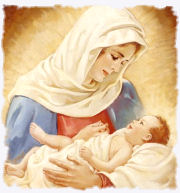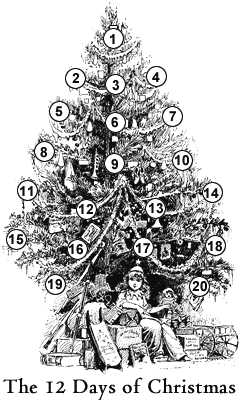Breviary
Thursday, 8 January 2015
Thursday after Epiphany
... recognized Mary's title of Theotokos, Mother of God.
Dom Donald's Blog: MARY, MOTHER OF GOD The most famous Marian homily ...: Hogmanay New Year CHRISTMASTIDE Octave of Christmas 1 January MARY, MOTHER OF GOD The mos...
Wednesday, 1 January 2014
MARY, MOTHER OF GOD The most famous Marian homily of antiquity
Hogmanay New Year
CHRISTMASTIDE
Octave of Christmas
1 January
MARY, MOTHER OF GOD
The most famous Marian homily of antiquity
From a homily by Saint Cyril of
(Hom. 4: PG 77, 991.995-996)
This is the most famous Marian homily of antiquity. It was delivered in the
Mary, Mother of God, we salute you. Precious vessel, worthy of the whole world's reverence, you are an ever-shining light, the crown of virginity, the symbol of orthodoxy, an indestructible temple, the place that held him whom no place can contain, mother and virgin. Because of you the holy gospels could say:
Blessed is he who comes in the name of the Lord.
We salute you, for in your holy womb he, who is beyond all limitation, was confined. Because of you the holy Trinity is glorified and adored; the cross is called precious and is venerated throughout the world; the heavens exult; the angels and archangels make merry; demons are put to flight; the devil, that tempter, is thrust down from heaven; the fallen race of man is taken up on high; all creatures possessed by the madness of idolatry have attained knowledge of the truth; believers receive holy baptism; the oil of gladness is poured out; the Church is established throughout the world; pagans are brought to repentance.
What more is there to say? Because of you the light of the only-begotten Son of God has shone upon those who sat in darkness and in the shadow of death; prophets pronounced the word of God; the apostles preached salvation to the Gentiles; the dead are raised to life, and kings rule by the power of the holy Trinity.
Who can put Mary's high honour into words? She is both mother and virgin. I am overwhelmed by the wonder of this miracle. Of course no one could be prevented from living in the house he had built for himself, yet who would invite mockery by asking his own servant to become his mother?
Behold then the joy of the whole universe. Let the union of God and man in the Son of the Virgin Mary fill us with awe and adoration. Let us fear and worship the undivided Trinity as we sing the praise of the ever-virgin Mary, the holy
|
iBreviary
http://www.ibreviary.com/m/breviario.php?s=ufficio_delle_lettureSECOND
READING
From a commentary on the Gospel of John by Saint Cyril of Alexandria, bishop
(Lib. 5, Cap. 2: PG 73, 751-754)
The gift of the Holy Spirit to all mankind
In a plan of surpassing beauty the Creator of the universe decreed the renewal of all things in Christ. In his design for restoring human nature to its original condition, he gave a promise that he would pour out on it the Holy Spirit along with his other gifts, for otherwise our nature could not enter once more into the peaceful and secure possession of those gifts.
He therefore appointed a time for the Holy Spirit to come upon us: this was the time of Christ’s coming. He gave this promise when he said: In those days, that is, the days of the Savior, I will pour out a share of my Spirit on all mankind.
When the time came for this great act of unforced generosity, which revealed in our midst the only-begotten Son, clothed with flesh on this earth, a man born of woman, in accordance with Holy Scripture, God the Father gave the Spirit once again. Christ, as the first fruits of our restored nature, was the first to receive the Spirit. John the Baptist bore witness to this when he said: I saw the Spirit coming down from heaven, and it rested on him.
Christ “received the Spirit” in so far as he was man, and in so far as man could receive the Spirit. He did so in such a way that, though he is the Son of God the Father, begotten of his substance, even before the incarnation, indeed before all ages, yet he was not offended at hearing the Father say to him after he had become man: You are my Son; today I have begotten you.
The Father says of Christ, who was God, begotten of him before the ages, that he has been “begotten today,” for the Father is to accept us in Christ as his adopted children. The whole of our nature is present in Christ, in so far as he is man. So the Father can be said to give the Spirit again to the Son, though the Son possesses the Spirit as his own, in order that we may receive the Spirit in Christ. The Son therefore took to himself the seed of Abraham, as Scripture says, and became like his brothers in all things.
The only-begotten Son received the Spirit, but not for his own advantage, for the Spirit is his, and is given in him and through him, as we have already said. He receives it to renew our nature in its entirety and to make it whole again, for in becoming man he took our entire nature to himself. If we reason correctly, and use also the testimony of Scripture, we can see that Christ did not receive the Spirit for himself, but rather for us in him; for it is also through Christ that all gifts come down to us.
RESPONSORY
Ezekiel 37:27-28; Hebrews 8:8
I will be their God and they shall be my people.
– The nations shall know that I am the Lord, the Sanctifier of Israel,
when my holiness will be established in their midst for all eternity.
I shall bring to fulfillment my new convenant
with the house of Israel and with the house of Judah.
– The nations shall know that I am the Lord, the Sanctifier of Israel,
when my holiness will be established in their midst for all eternity.
CONCLUDING PRAYER
Let us pray.
God our Father,
through Christ your Son
the hope of eternal life dawned on our world.
Give to us the light of faith
that we may always acknowledge him as our Redeemer,
and come to the glory of his kingdom,
where he lives and reigns with you and the Holy Spirit,
one God, for ever and ever.
– Amen.
From a commentary on the Gospel of John by Saint Cyril of Alexandria, bishop
(Lib. 5, Cap. 2: PG 73, 751-754)
The gift of the Holy Spirit to all mankind
In a plan of surpassing beauty the Creator of the universe decreed the renewal of all things in Christ. In his design for restoring human nature to its original condition, he gave a promise that he would pour out on it the Holy Spirit along with his other gifts, for otherwise our nature could not enter once more into the peaceful and secure possession of those gifts.
He therefore appointed a time for the Holy Spirit to come upon us: this was the time of Christ’s coming. He gave this promise when he said: In those days, that is, the days of the Savior, I will pour out a share of my Spirit on all mankind.
When the time came for this great act of unforced generosity, which revealed in our midst the only-begotten Son, clothed with flesh on this earth, a man born of woman, in accordance with Holy Scripture, God the Father gave the Spirit once again. Christ, as the first fruits of our restored nature, was the first to receive the Spirit. John the Baptist bore witness to this when he said: I saw the Spirit coming down from heaven, and it rested on him.
Christ “received the Spirit” in so far as he was man, and in so far as man could receive the Spirit. He did so in such a way that, though he is the Son of God the Father, begotten of his substance, even before the incarnation, indeed before all ages, yet he was not offended at hearing the Father say to him after he had become man: You are my Son; today I have begotten you.
The Father says of Christ, who was God, begotten of him before the ages, that he has been “begotten today,” for the Father is to accept us in Christ as his adopted children. The whole of our nature is present in Christ, in so far as he is man. So the Father can be said to give the Spirit again to the Son, though the Son possesses the Spirit as his own, in order that we may receive the Spirit in Christ. The Son therefore took to himself the seed of Abraham, as Scripture says, and became like his brothers in all things.
The only-begotten Son received the Spirit, but not for his own advantage, for the Spirit is his, and is given in him and through him, as we have already said. He receives it to renew our nature in its entirety and to make it whole again, for in becoming man he took our entire nature to himself. If we reason correctly, and use also the testimony of Scripture, we can see that Christ did not receive the Spirit for himself, but rather for us in him; for it is also through Christ that all gifts come down to us.
RESPONSORY
Ezekiel 37:27-28; Hebrews 8:8
I will be their God and they shall be my people.
– The nations shall know that I am the Lord, the Sanctifier of Israel,
when my holiness will be established in their midst for all eternity.
I shall bring to fulfillment my new convenant
with the house of Israel and with the house of Judah.
– The nations shall know that I am the Lord, the Sanctifier of Israel,
when my holiness will be established in their midst for all eternity.
CONCLUDING PRAYER
Let us pray.
God our Father,
through Christ your Son
the hope of eternal life dawned on our world.
Give to us the light of faith
that we may always acknowledge him as our Redeemer,
and come to the glory of his kingdom,
where he lives and reigns with you and the Holy Spirit,
one God, for ever and ever.
– Amen.









